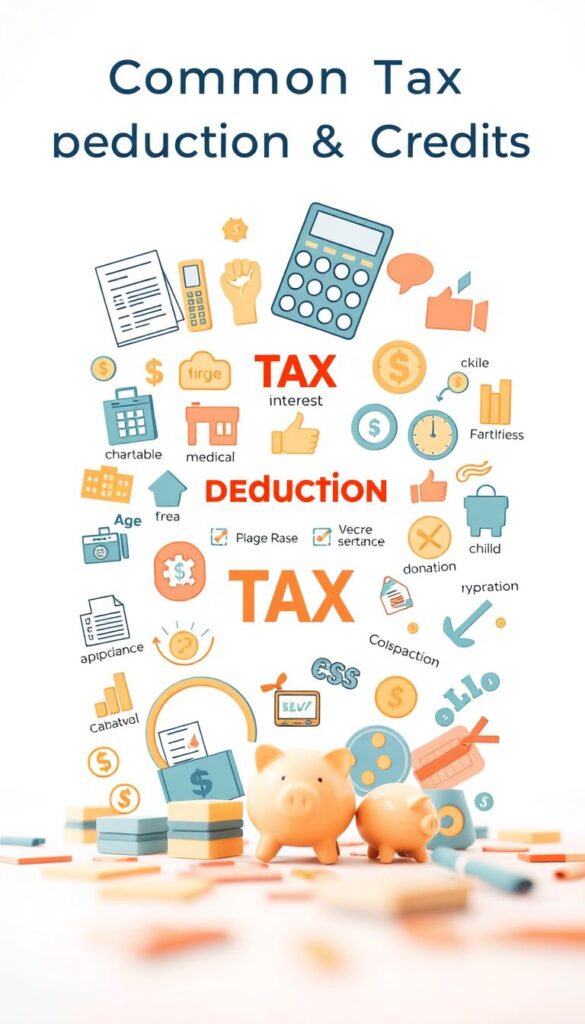Are you ready to tackle the complex world of tax rules and strategies? These can greatly affect your financial future. As we approach 2025, it’s key to understand tax planning. Changes in income tax rates, standard deductions, and credits are on the horizon.
By learning tax planning tips for 2025, you can save more. This way, you’ll feel confident when tax season comes. Working with a tax advisor can also help. They can give you advice that fits your financial needs, making tax prep easier.
Key Takeaways
- Proactive tax planning can lead to significant savings when filing your taxes.
- Understanding your tax bracket is key for a good financial plan.
- Using deductions and credits can lower your tax bill.
- The standard deduction for 2025 has gone up, changing how you plan your deductions.
- Getting advice from a tax advisor can offer strategies that fit your financial situation.
Understanding Your Tax Bracket
The United States has a progressive tax system. It means tax rates go up as your income does. There are seven tax brackets: 10%, 12%, 22%, 24%, 32%, 35%, and 37%. Knowing your taxable income helps figure out your tax rates.
Taxable income is what you earn minus any deductions. For example, if you earn $50,000 and have deductions, you only pay higher rates on what’s left. This is after you’ve subtracted deductions from your total income.
In 2025, the standard deduction for single taxpayers is $15,000. For married couples filing jointly, it’s $30,000. This deduction lowers your taxable income. It helps reduce the amount taxed at higher rates.
For instance, if you earn $626,351 or more as a single filer, you’re in the 37% bracket. But, if you earn $100,000, your effective tax rate could be lower. This is because of how deductions and tax brackets work together.
| Taxable Income Range | Tax Rate |
|---|---|
| $0 – $11,925 | 10% |
| $11,926 – $48,475 | 12% |
| $48,476 – $103,350 | 22% |
| $103,351 – $197,300 | 24% |
| $197,301 – $250,525 | 32% |
| $250,526 – $626,350 | 35% |
| $626,351 and up | 37% |
Knowing your tax bracket is key to tax planning. By using deductions and understanding your taxable income, you can lower your taxes. This is true for the higher tax rates on certain income levels.
The Importance of Tax Deductions and Credits
Knowing about tax deductions and credits is key for smart tax planning. They both aim to lower your tax bill.
Tax deductions cut your taxable income. For example, if you put $6,000 into a deductible IRA, you might save about $1,500 in taxes if you’re in the 25% bracket. This means you only pay taxes on what’s left after deductions. In 2024, the standard deduction is $14,600 for singles and $29,200 for married couples filing together, helping you save a lot.
Tax credits, on the other hand, directly cut your tax bill by a dollar for every dollar. A $1,000 credit means you pay $1,000 less in taxes. This makes credits more valuable than deductions of the same amount. By understanding these differences, you can make the most of your tax strategy.

Using both tax credits and deductions is essential for reducing your tax bill. Different credits or deductions apply in different situations, like education, medical costs, or retirement savings. Knowing which ones you can use helps you plan a strong financial strategy that lowers your taxes.
| Type | Explanation | Example |
|---|---|---|
| Tax Deduction | Reduces taxable income | Contribution to a traditional IRA |
| Tax Credit | Reduces tax liability dollar-for-dollar | Child tax credit |
| Standard Deduction | Set amount reduces taxable income | Single filer: $14,600 |
| Itemized Deductions | Total of allowable deductions | Medical expenses exceeding 7.5% of AGI |
In summary, using both tax deductions and credits can greatly improve your finances. Understanding how they work together helps you plan better and save more.
Tax Planning Tips for 2025
As 2025 approaches, it’s key to plan your taxes well. Start by looking at your current finances. This helps you create smart tax strategies. You’ll be able to reduce your taxes and save more.
Evaluating Your Current Financial Situation
Look at all parts of your finances, like income, deductions, and debts. Changes in income or family size can affect your taxes. Knowing your tax bracket helps you plan better.
For example, if you’re married or single and your income is between certain levels, you might find ways to save more on taxes.
Maximizing Available Tax Deductions and Credits
Using tax deductions and credits is vital for 2025. Contributions to retirement accounts and education credits can save you a lot. Keep records of deductible expenses to claim everything you can.
The rule for medical expenses is 7.5% of your income. So, document any medical costs you have.
| Tax Bracket | Married Filing Jointly (MFJ) | Single Filers |
|---|---|---|
| 10% | $0 – $23,850 | $0 – $11,925 |
| 12% | $23,851 – $96,950 | $11,926 – $48,475 |
| 22% | $96,951 – $206,700 | $48,476 – $103,350 |
| 24% | $206,701 – $394,600 | $103,351 – $197,300 |
| 32% | $394,601 – $501,050 | $197,301 – $250,525 |
| 35% | $501,051 – $751,600 | $250,526 – $626,350 |
| 37% | Over $751,600 | Over $626,350 |
Deciding Between Standard Deduction and Itemizing
Choosing the right tax return strategy is key. You must decide between the standard deduction and itemizing deductions. For 2023, the standard deduction is $13,850 for singles and married individuals filing separately. It’s $20,800 for heads of household and $27,700 for married couples filing jointly.
By 2024, these amounts will go up. They will be $14,600, $21,900, and $29,200, respectively. Almost 90% of taxpayers choose the standard deduction. This is because it makes filing taxes easier.
If your itemized deductions are more than the standard deduction, itemizing might be better. Remember, medical and dental expenses need to be over 7.5% of your AGI to be deductible. State and local tax deductions have a cap of $10,000.
It’s important to keep track of your deductions all year. This is true if you think itemizing could help you more. For 2025, the amounts will increase even more. Knowing how these figures can help you is key.
Choosing the standard deduction can save you about $100 in tax preparation costs. This makes it a popular choice for many taxpayers.

Essential Tax-Saving Strategies
It’s important to use tax-saving strategies to lower your tax bill and save more. Using retirement accounts like 401(k)s and IRAs can help protect your income from taxes. Knowing how much you can contribute and the benefits of these accounts can boost your retirement savings.
Utilizing 401(k) and IRA Contributions
In 2025, you can put up to $23,500 into a 401(k) plan. If you’re 50 or older, you can add another $7,500. These accounts offer tax-deferred savings, which can lower your taxable income. Traditional IRAs let you contribute up to $7,000, with an extra $1,000 if you’re 50 or older.
These strategies not only cut your taxes now but also help your retirement savings grow. They do so in a way that’s more tax-efficient.
Exploring Health Savings Accounts (HSAs)
Health Savings Accounts (HSAs) are also great for saving on taxes. In 2025, you can contribute up to $4,300 for yourself or $8,550 for your family. The best part is, you can deduct these contributions from your taxes, which can really help lower your taxable income.
Plus, HSAs offer triple tax benefits. Your money grows tax-free, and you can withdraw it tax-free for medical expenses. This makes HSAs a key part of any good tax-saving plan.

Popular Tax Deductions and Credits to Consider
Taxpayers often miss out on common tax deductions and valuable tax credits. These can greatly lower your tax bill. Knowing about them is key to a smart financial plan.

There are many deductions, like mortgage interest and student loan interest. These can cut down your taxable income and save you money. Tax credits for adoption and college expenses also offer big savings by directly reducing what you owe in taxes.
- Child Tax Credit: Offers up to $2,000 per child, with eligibility based on modified AGI under $400,000 for married couples.
- Earned Income Tax Credit (EITC): A credit that can provide up to $7,830, depending on income and filing status, with AGI thresholds for eligibility.
- Charitable Contributions: Taxpayers can deduct contributions made to qualified organizations, potentially receiving up to $600 for married filers or $300 for other statuses if claiming the standard deduction.
- Adoption Credit: Covers adoption expenses up to $16,810 per child, subject to income limits.
- Saver’s Credit: Provides between 10% to 50% on retirement contributions for eligible taxpayers with low to moderate income, maxing out at $2,000 for individuals.
Talking to a tax professional can uncover more ways to save. Staying informed about tax credits helps you make the most of them as tax laws evolve.
Maintaining Proper Tax Records
Keeping your tax records accurate and organized is key to following the rules and getting ready for IRS audits. Having your tax documents in order makes filing taxes easier and helps avoid problems during audits. The IRS can audit you within three years after you file your taxes. So, it’s important to keep important records for at least that long.
What Records to Keep for Tax Returns
You need to keep different documents about your income and deductions. Important tax records include:
- W-2 forms from employers
- 1099 statements showing additional income
- Receipts for deductible expenses
- Proof of tax credits claimed
- Bank and brokerage statements indicating financial transactions
Keeping these documents organized helps you report your information clearly. This is helpful during tax filing and if you face an IRS audit.
Understanding Audit Duration and Specifics
An IRS audit can take months, depending on how complex your tax return is. Being ready can make the process easier. If you have issues with your income, it’s smart to keep records for six years. Being open with your tax documents can help avoid problems during audits.
Here’s a table that shows how long audits can last based on the issues found:
| Audit Type | Time Frame to Initiate | Record Retention Recommendations |
|---|---|---|
| Regular audits | 3 years | At least 3 years |
| Substantial underreporting | 6 years | At least 6 years |
| Fraudulent returns | No time limit | Indefinitely |

Tweaking Your W-4 for Better Tax Planning
Your W-4 form is key in figuring out how much tax to take out of your paycheck. It helps you plan your taxes better. By changing your W-4, you can adjust how much tax is taken out each month. This can help avoid big tax bills or surprise refunds.
If you want to take out more tax, think about adding extra money, like $100 each month. People who make more money usually have more tax taken out. The number of allowances you claim on your W-4 affects how much tax is taken out. Claiming more allowances means less tax taken out, and claiming fewer means more.
Changes in your life, like getting married or having a child, mean you should check your W-4. The IRS has a tax withholding calculator to help figure out the right amount based on your situation.

Keeping your W-4 in balance helps avoid paying too much in taxes and reduces the chance of owing money. The aim is to match your paycheck withholding with your expected tax payments. This makes tax time less stressful. Regularly checking and adjusting your W-4 helps with good tax planning.
Advanced Tax Strategies for Wealth Management
Effective wealth management strategies can greatly improve your financial situation and lower taxes. By focusing on tax-efficient investing, you can maximize your returns while following tax laws.
In 2025, you can contribute up to $23,500 to a 401(k) plan, with an extra $7,500 if you’re 50 or older. This helps grow your retirement savings and reduces your taxes now. IRA contributions are capped at $7,000, with an extra $1,000 for those 50 and up. Both are key tools for managing your wealth.
For those 73 or older, understanding Required Minimum Distributions (RMDs) is vital. Not following RMD rules can lead to a 50% penalty on missed distributions. Using Qualified Charitable Distributions (QCDs) lets you give up to $105,000 to charity, cutting your taxes.
Tax-loss harvesting is another smart move, useful in shaky markets. It helps balance gains and losses to lower your taxes. Adding health savings accounts (HSAs) to your plan offers a triple tax benefit: tax-deductible contributions, tax-free growth, and withdrawals for medical costs.
Don’t overlook Donor-Advised Funds (DAFs) and Charitable Remainder Trusts for tax efficiency. DAFs give you an immediate tax break, while Charitable Remainder Trusts delay taxes on asset sales, giving you a partial deduction. These strategies are part of a solid wealth management plan.
| Strategy | Description | Tax Benefits |
|---|---|---|
| 401(k) Contributions | Savings for retirement with tax-deferred growth. | Reduces taxable income for the year. |
| IRA Contributions | Retirement accounts for individuals. | Tax-deferred growth, possible deductions. |
| Qualified Charitable Distributions | Donations directly from IRAs for seniors. | Reduces taxable income, avoids RMD taxes. |
| Tax-Loss Harvesting | Offset gains with losses. | Lowers overall tax liability. |
| Health Savings Accounts | Tax-favored savings for medical expenses. | Triple tax advantage on contributions, growth, and withdrawals. |

Creating a strong wealth management plan needs careful thought and knowledge of tax-efficient investing. By using these advanced strategies, you can greatly improve your financial future.
Charitable Contributions and Their Tax Implications
Charitable giving lets you support causes you care about and might help your taxes. Donations to approved groups can lower your taxes. Knowing the rules can help you get the most benefits.
In 2024, you can donate up to 60% of your income to public charities. If tax laws change, this limit might drop to 50%. This shows why planning your donations is key.
People 70½ and older can donate from their IRAs to charities. This way, you don’t have to pay taxes on the money. Donating appreciated securities also saves you from capital gains taxes.

Charitable Remainder Trusts offer big benefits. They let you get a tax deduction now and save on capital gains. For those with a lot of wealth, knowing about estate tax changes is important.
It’s important to keep records for at least three years after filing. You need a written receipt for donations over $250. Donations over $5,000 need an appraisal. If you go over limits, you can carry over for up to five years.
Remember, donations must be made by December 31 to count for the current year. You can also deduct mileage for volunteer work at $0.14 per mile. Knowing these details can help you manage your taxes better.
Conclusion
As the year ends, it’s time to think about your tax planning for 2025. You need to know your tax bracket, deductions, and credits. Also, understand how new tax laws might change things for you.
Changes in standard deductions and tax credits are important. They come from inflation and new laws. Planning smart can help lower your taxes and improve your finances. Being informed and proactive is key for 2025.
Good tax planning can save you money and improve your financial future. Use what you learned to make your plans better. A solid tax plan will help you manage your finances well as we start the new year.
FAQ
What is the importance of tax planning for 2025?
How do tax brackets affect my taxable income?
What are the key differences between tax deductions and tax credits?
FAQ
What is the importance of tax planning for 2025?
Tax planning is key to understanding your finances and saving for taxes. It helps you save a lot when you file your taxes.
How do tax brackets affect my taxable income?
The U.S. has a progressive tax system. This means higher income levels have higher tax rates. Knowing your taxable income helps you figure out your tax rate and how much you’ll pay.
What are the key differences between tax deductions and tax credits?
Tax deductions lower your taxable income. Tax credits, on the other hand, directly reduce your tax bill. For example, a
FAQ
What is the importance of tax planning for 2025?
Tax planning is key to understanding your finances and saving for taxes. It helps you save a lot when you file your taxes.
How do tax brackets affect my taxable income?
The U.S. has a progressive tax system. This means higher income levels have higher tax rates. Knowing your taxable income helps you figure out your tax rate and how much you’ll pay.
What are the key differences between tax deductions and tax credits?
Tax deductions lower your taxable income. Tax credits, on the other hand, directly reduce your tax bill. For example, a $1,000 credit cuts your tax by $1,000, while a deduction lowers the income you pay taxes on.
How can I evaluate my financial situation for tax planning?
Review your income, expenses, and tax liabilities to evaluate your finances. Consider changes in income, family size, and job status that might affect your taxes.
Should I choose the standard deduction or itemize my deductions?
Deciding between the standard deduction and itemizing depends on your total deductions. Keep track of your itemized deductions to make this choice.
What are effective tax-saving strategies for individuals?
Using retirement accounts like 401(k)s and IRAs can lower your taxable income. Health Savings Accounts (HSAs) also offer tax-free savings for medical expenses.
What popular tax deductions and credits should I consider?
Consider deductions for mortgage interest, student loan interest, and education expenses. Also, look into credits for adoption and education, which can save you a lot on taxes.
How can I maintain proper tax records?
Keep detailed records for accurate reporting and audits. Keep documents for at least three years, and longer if needed. Include income statements, receipts for deductions, and tax credit documentation.
What is the purpose of adjusting my W-4 form?
Your W-4 form controls how much tax is taken from your paycheck. Adjusting it helps match your financial goals, avoiding big tax bills or unwanted refunds.
What are advanced tax strategies for wealth management?
Advanced strategies include using tax-advantaged accounts and optimizing capital gains. Understanding different investments is also key.
How can charitable contributions benefit me tax-wise?
Charitable donations are tax-deductible and can improve your tax situation. For those over 70½, IRA direct contributions can also reduce taxable income.
,000 credit cuts your tax by
FAQ
What is the importance of tax planning for 2025?
Tax planning is key to understanding your finances and saving for taxes. It helps you save a lot when you file your taxes.
How do tax brackets affect my taxable income?
The U.S. has a progressive tax system. This means higher income levels have higher tax rates. Knowing your taxable income helps you figure out your tax rate and how much you’ll pay.
What are the key differences between tax deductions and tax credits?
Tax deductions lower your taxable income. Tax credits, on the other hand, directly reduce your tax bill. For example, a $1,000 credit cuts your tax by $1,000, while a deduction lowers the income you pay taxes on.
How can I evaluate my financial situation for tax planning?
Review your income, expenses, and tax liabilities to evaluate your finances. Consider changes in income, family size, and job status that might affect your taxes.
Should I choose the standard deduction or itemize my deductions?
Deciding between the standard deduction and itemizing depends on your total deductions. Keep track of your itemized deductions to make this choice.
What are effective tax-saving strategies for individuals?
Using retirement accounts like 401(k)s and IRAs can lower your taxable income. Health Savings Accounts (HSAs) also offer tax-free savings for medical expenses.
What popular tax deductions and credits should I consider?
Consider deductions for mortgage interest, student loan interest, and education expenses. Also, look into credits for adoption and education, which can save you a lot on taxes.
How can I maintain proper tax records?
Keep detailed records for accurate reporting and audits. Keep documents for at least three years, and longer if needed. Include income statements, receipts for deductions, and tax credit documentation.
What is the purpose of adjusting my W-4 form?
Your W-4 form controls how much tax is taken from your paycheck. Adjusting it helps match your financial goals, avoiding big tax bills or unwanted refunds.
What are advanced tax strategies for wealth management?
Advanced strategies include using tax-advantaged accounts and optimizing capital gains. Understanding different investments is also key.
How can charitable contributions benefit me tax-wise?
Charitable donations are tax-deductible and can improve your tax situation. For those over 70½, IRA direct contributions can also reduce taxable income.
,000, while a deduction lowers the income you pay taxes on.
How can I evaluate my financial situation for tax planning?
Review your income, expenses, and tax liabilities to evaluate your finances. Consider changes in income, family size, and job status that might affect your taxes.
Should I choose the standard deduction or itemize my deductions?
Deciding between the standard deduction and itemizing depends on your total deductions. Keep track of your itemized deductions to make this choice.
What are effective tax-saving strategies for individuals?
Using retirement accounts like 401(k)s and IRAs can lower your taxable income. Health Savings Accounts (HSAs) also offer tax-free savings for medical expenses.
What popular tax deductions and credits should I consider?
Consider deductions for mortgage interest, student loan interest, and education expenses. Also, look into credits for adoption and education, which can save you a lot on taxes.
How can I maintain proper tax records?
Keep detailed records for accurate reporting and audits. Keep documents for at least three years, and longer if needed. Include income statements, receipts for deductions, and tax credit documentation.
What is the purpose of adjusting my W-4 form?
Your W-4 form controls how much tax is taken from your paycheck. Adjusting it helps match your financial goals, avoiding big tax bills or unwanted refunds.
What are advanced tax strategies for wealth management?
Advanced strategies include using tax-advantaged accounts and optimizing capital gains. Understanding different investments is also key.
How can charitable contributions benefit me tax-wise?
Charitable donations are tax-deductible and can improve your tax situation. For those over 70½, IRA direct contributions can also reduce taxable income.
FAQ
What is the importance of tax planning for 2025?
Tax planning is key to understanding your finances and saving for taxes. It helps you save a lot when you file your taxes.
How do tax brackets affect my taxable income?
The U.S. has a progressive tax system. This means higher income levels have higher tax rates. Knowing your taxable income helps you figure out your tax rate and how much you’ll pay.
What are the key differences between tax deductions and tax credits?
Tax deductions lower your taxable income. Tax credits, on the other hand, directly reduce your tax bill. For example, a
FAQ
What is the importance of tax planning for 2025?
Tax planning is key to understanding your finances and saving for taxes. It helps you save a lot when you file your taxes.
How do tax brackets affect my taxable income?
The U.S. has a progressive tax system. This means higher income levels have higher tax rates. Knowing your taxable income helps you figure out your tax rate and how much you’ll pay.
What are the key differences between tax deductions and tax credits?
Tax deductions lower your taxable income. Tax credits, on the other hand, directly reduce your tax bill. For example, a $1,000 credit cuts your tax by $1,000, while a deduction lowers the income you pay taxes on.
How can I evaluate my financial situation for tax planning?
Review your income, expenses, and tax liabilities to evaluate your finances. Consider changes in income, family size, and job status that might affect your taxes.
Should I choose the standard deduction or itemize my deductions?
Deciding between the standard deduction and itemizing depends on your total deductions. Keep track of your itemized deductions to make this choice.
What are effective tax-saving strategies for individuals?
Using retirement accounts like 401(k)s and IRAs can lower your taxable income. Health Savings Accounts (HSAs) also offer tax-free savings for medical expenses.
What popular tax deductions and credits should I consider?
Consider deductions for mortgage interest, student loan interest, and education expenses. Also, look into credits for adoption and education, which can save you a lot on taxes.
How can I maintain proper tax records?
Keep detailed records for accurate reporting and audits. Keep documents for at least three years, and longer if needed. Include income statements, receipts for deductions, and tax credit documentation.
What is the purpose of adjusting my W-4 form?
Your W-4 form controls how much tax is taken from your paycheck. Adjusting it helps match your financial goals, avoiding big tax bills or unwanted refunds.
What are advanced tax strategies for wealth management?
Advanced strategies include using tax-advantaged accounts and optimizing capital gains. Understanding different investments is also key.
How can charitable contributions benefit me tax-wise?
Charitable donations are tax-deductible and can improve your tax situation. For those over 70½, IRA direct contributions can also reduce taxable income.
,000 credit cuts your tax by
FAQ
What is the importance of tax planning for 2025?
Tax planning is key to understanding your finances and saving for taxes. It helps you save a lot when you file your taxes.
How do tax brackets affect my taxable income?
The U.S. has a progressive tax system. This means higher income levels have higher tax rates. Knowing your taxable income helps you figure out your tax rate and how much you’ll pay.
What are the key differences between tax deductions and tax credits?
Tax deductions lower your taxable income. Tax credits, on the other hand, directly reduce your tax bill. For example, a $1,000 credit cuts your tax by $1,000, while a deduction lowers the income you pay taxes on.
How can I evaluate my financial situation for tax planning?
Review your income, expenses, and tax liabilities to evaluate your finances. Consider changes in income, family size, and job status that might affect your taxes.
Should I choose the standard deduction or itemize my deductions?
Deciding between the standard deduction and itemizing depends on your total deductions. Keep track of your itemized deductions to make this choice.
What are effective tax-saving strategies for individuals?
Using retirement accounts like 401(k)s and IRAs can lower your taxable income. Health Savings Accounts (HSAs) also offer tax-free savings for medical expenses.
What popular tax deductions and credits should I consider?
Consider deductions for mortgage interest, student loan interest, and education expenses. Also, look into credits for adoption and education, which can save you a lot on taxes.
How can I maintain proper tax records?
Keep detailed records for accurate reporting and audits. Keep documents for at least three years, and longer if needed. Include income statements, receipts for deductions, and tax credit documentation.
What is the purpose of adjusting my W-4 form?
Your W-4 form controls how much tax is taken from your paycheck. Adjusting it helps match your financial goals, avoiding big tax bills or unwanted refunds.
What are advanced tax strategies for wealth management?
Advanced strategies include using tax-advantaged accounts and optimizing capital gains. Understanding different investments is also key.
How can charitable contributions benefit me tax-wise?
Charitable donations are tax-deductible and can improve your tax situation. For those over 70½, IRA direct contributions can also reduce taxable income.
,000, while a deduction lowers the income you pay taxes on.
How can I evaluate my financial situation for tax planning?
Review your income, expenses, and tax liabilities to evaluate your finances. Consider changes in income, family size, and job status that might affect your taxes.
Should I choose the standard deduction or itemize my deductions?
Deciding between the standard deduction and itemizing depends on your total deductions. Keep track of your itemized deductions to make this choice.
What are effective tax-saving strategies for individuals?
Using retirement accounts like 401(k)s and IRAs can lower your taxable income. Health Savings Accounts (HSAs) also offer tax-free savings for medical expenses.
What popular tax deductions and credits should I consider?
Consider deductions for mortgage interest, student loan interest, and education expenses. Also, look into credits for adoption and education, which can save you a lot on taxes.
How can I maintain proper tax records?
Keep detailed records for accurate reporting and audits. Keep documents for at least three years, and longer if needed. Include income statements, receipts for deductions, and tax credit documentation.
What is the purpose of adjusting my W-4 form?
Your W-4 form controls how much tax is taken from your paycheck. Adjusting it helps match your financial goals, avoiding big tax bills or unwanted refunds.
What are advanced tax strategies for wealth management?
Advanced strategies include using tax-advantaged accounts and optimizing capital gains. Understanding different investments is also key.
How can charitable contributions benefit me tax-wise?
Charitable donations are tax-deductible and can improve your tax situation. For those over 70½, IRA direct contributions can also reduce taxable income.
FAQ
What is the importance of tax planning for 2025?
Tax planning is key to understanding your finances and saving for taxes. It helps you save a lot when you file your taxes.
How do tax brackets affect my taxable income?
The U.S. has a progressive tax system. This means higher income levels have higher tax rates. Knowing your taxable income helps you figure out your tax rate and how much you’ll pay.
What are the key differences between tax deductions and tax credits?
Tax deductions lower your taxable income. Tax credits, on the other hand, directly reduce your tax bill. For example, a
FAQ
What is the importance of tax planning for 2025?
Tax planning is key to understanding your finances and saving for taxes. It helps you save a lot when you file your taxes.
How do tax brackets affect my taxable income?
The U.S. has a progressive tax system. This means higher income levels have higher tax rates. Knowing your taxable income helps you figure out your tax rate and how much you’ll pay.
What are the key differences between tax deductions and tax credits?
Tax deductions lower your taxable income. Tax credits, on the other hand, directly reduce your tax bill. For example, a $1,000 credit cuts your tax by $1,000, while a deduction lowers the income you pay taxes on.
How can I evaluate my financial situation for tax planning?
Review your income, expenses, and tax liabilities to evaluate your finances. Consider changes in income, family size, and job status that might affect your taxes.
Should I choose the standard deduction or itemize my deductions?
Deciding between the standard deduction and itemizing depends on your total deductions. Keep track of your itemized deductions to make this choice.
What are effective tax-saving strategies for individuals?
Using retirement accounts like 401(k)s and IRAs can lower your taxable income. Health Savings Accounts (HSAs) also offer tax-free savings for medical expenses.
What popular tax deductions and credits should I consider?
Consider deductions for mortgage interest, student loan interest, and education expenses. Also, look into credits for adoption and education, which can save you a lot on taxes.
How can I maintain proper tax records?
Keep detailed records for accurate reporting and audits. Keep documents for at least three years, and longer if needed. Include income statements, receipts for deductions, and tax credit documentation.
What is the purpose of adjusting my W-4 form?
Your W-4 form controls how much tax is taken from your paycheck. Adjusting it helps match your financial goals, avoiding big tax bills or unwanted refunds.
What are advanced tax strategies for wealth management?
Advanced strategies include using tax-advantaged accounts and optimizing capital gains. Understanding different investments is also key.
How can charitable contributions benefit me tax-wise?
Charitable donations are tax-deductible and can improve your tax situation. For those over 70½, IRA direct contributions can also reduce taxable income.
,000 credit cuts your tax by
FAQ
What is the importance of tax planning for 2025?
Tax planning is key to understanding your finances and saving for taxes. It helps you save a lot when you file your taxes.
How do tax brackets affect my taxable income?
The U.S. has a progressive tax system. This means higher income levels have higher tax rates. Knowing your taxable income helps you figure out your tax rate and how much you’ll pay.
What are the key differences between tax deductions and tax credits?
Tax deductions lower your taxable income. Tax credits, on the other hand, directly reduce your tax bill. For example, a $1,000 credit cuts your tax by $1,000, while a deduction lowers the income you pay taxes on.
How can I evaluate my financial situation for tax planning?
Review your income, expenses, and tax liabilities to evaluate your finances. Consider changes in income, family size, and job status that might affect your taxes.
Should I choose the standard deduction or itemize my deductions?
Deciding between the standard deduction and itemizing depends on your total deductions. Keep track of your itemized deductions to make this choice.
What are effective tax-saving strategies for individuals?
Using retirement accounts like 401(k)s and IRAs can lower your taxable income. Health Savings Accounts (HSAs) also offer tax-free savings for medical expenses.
What popular tax deductions and credits should I consider?
Consider deductions for mortgage interest, student loan interest, and education expenses. Also, look into credits for adoption and education, which can save you a lot on taxes.
How can I maintain proper tax records?
Keep detailed records for accurate reporting and audits. Keep documents for at least three years, and longer if needed. Include income statements, receipts for deductions, and tax credit documentation.
What is the purpose of adjusting my W-4 form?
Your W-4 form controls how much tax is taken from your paycheck. Adjusting it helps match your financial goals, avoiding big tax bills or unwanted refunds.
What are advanced tax strategies for wealth management?
Advanced strategies include using tax-advantaged accounts and optimizing capital gains. Understanding different investments is also key.
How can charitable contributions benefit me tax-wise?
Charitable donations are tax-deductible and can improve your tax situation. For those over 70½, IRA direct contributions can also reduce taxable income.
,000, while a deduction lowers the income you pay taxes on.
How can I evaluate my financial situation for tax planning?
Review your income, expenses, and tax liabilities to evaluate your finances. Consider changes in income, family size, and job status that might affect your taxes.
Should I choose the standard deduction or itemize my deductions?
Deciding between the standard deduction and itemizing depends on your total deductions. Keep track of your itemized deductions to make this choice.
What are effective tax-saving strategies for individuals?
Using retirement accounts like 401(k)s and IRAs can lower your taxable income. Health Savings Accounts (HSAs) also offer tax-free savings for medical expenses.
What popular tax deductions and credits should I consider?
Consider deductions for mortgage interest, student loan interest, and education expenses. Also, look into credits for adoption and education, which can save you a lot on taxes.
How can I maintain proper tax records?
Keep detailed records for accurate reporting and audits. Keep documents for at least three years, and longer if needed. Include income statements, receipts for deductions, and tax credit documentation.
What is the purpose of adjusting my W-4 form?
Your W-4 form controls how much tax is taken from your paycheck. Adjusting it helps match your financial goals, avoiding big tax bills or unwanted refunds.
What are advanced tax strategies for wealth management?
Advanced strategies include using tax-advantaged accounts and optimizing capital gains. Understanding different investments is also key.
How can charitable contributions benefit me tax-wise?
Charitable donations are tax-deductible and can improve your tax situation. For those over 70½, IRA direct contributions can also reduce taxable income.
FAQ
What is the importance of tax planning for 2025?
Tax planning is key to understanding your finances and saving for taxes. It helps you save a lot when you file your taxes.
How do tax brackets affect my taxable income?
The U.S. has a progressive tax system. This means higher income levels have higher tax rates. Knowing your taxable income helps you figure out your tax rate and how much you’ll pay.
What are the key differences between tax deductions and tax credits?
Tax deductions lower your taxable income. Tax credits, on the other hand, directly reduce your tax bill. For example, a
FAQ
What is the importance of tax planning for 2025?
Tax planning is key to understanding your finances and saving for taxes. It helps you save a lot when you file your taxes.
How do tax brackets affect my taxable income?
The U.S. has a progressive tax system. This means higher income levels have higher tax rates. Knowing your taxable income helps you figure out your tax rate and how much you’ll pay.
What are the key differences between tax deductions and tax credits?
Tax deductions lower your taxable income. Tax credits, on the other hand, directly reduce your tax bill. For example, a $1,000 credit cuts your tax by $1,000, while a deduction lowers the income you pay taxes on.
How can I evaluate my financial situation for tax planning?
Review your income, expenses, and tax liabilities to evaluate your finances. Consider changes in income, family size, and job status that might affect your taxes.
Should I choose the standard deduction or itemize my deductions?
Deciding between the standard deduction and itemizing depends on your total deductions. Keep track of your itemized deductions to make this choice.
What are effective tax-saving strategies for individuals?
Using retirement accounts like 401(k)s and IRAs can lower your taxable income. Health Savings Accounts (HSAs) also offer tax-free savings for medical expenses.
What popular tax deductions and credits should I consider?
Consider deductions for mortgage interest, student loan interest, and education expenses. Also, look into credits for adoption and education, which can save you a lot on taxes.
How can I maintain proper tax records?
Keep detailed records for accurate reporting and audits. Keep documents for at least three years, and longer if needed. Include income statements, receipts for deductions, and tax credit documentation.
What is the purpose of adjusting my W-4 form?
Your W-4 form controls how much tax is taken from your paycheck. Adjusting it helps match your financial goals, avoiding big tax bills or unwanted refunds.
What are advanced tax strategies for wealth management?
Advanced strategies include using tax-advantaged accounts and optimizing capital gains. Understanding different investments is also key.
How can charitable contributions benefit me tax-wise?
Charitable donations are tax-deductible and can improve your tax situation. For those over 70½, IRA direct contributions can also reduce taxable income.
,000 credit cuts your tax by
FAQ
What is the importance of tax planning for 2025?
Tax planning is key to understanding your finances and saving for taxes. It helps you save a lot when you file your taxes.
How do tax brackets affect my taxable income?
The U.S. has a progressive tax system. This means higher income levels have higher tax rates. Knowing your taxable income helps you figure out your tax rate and how much you’ll pay.
What are the key differences between tax deductions and tax credits?
Tax deductions lower your taxable income. Tax credits, on the other hand, directly reduce your tax bill. For example, a $1,000 credit cuts your tax by $1,000, while a deduction lowers the income you pay taxes on.
How can I evaluate my financial situation for tax planning?
Review your income, expenses, and tax liabilities to evaluate your finances. Consider changes in income, family size, and job status that might affect your taxes.
Should I choose the standard deduction or itemize my deductions?
Deciding between the standard deduction and itemizing depends on your total deductions. Keep track of your itemized deductions to make this choice.
What are effective tax-saving strategies for individuals?
Using retirement accounts like 401(k)s and IRAs can lower your taxable income. Health Savings Accounts (HSAs) also offer tax-free savings for medical expenses.
What popular tax deductions and credits should I consider?
Consider deductions for mortgage interest, student loan interest, and education expenses. Also, look into credits for adoption and education, which can save you a lot on taxes.
How can I maintain proper tax records?
Keep detailed records for accurate reporting and audits. Keep documents for at least three years, and longer if needed. Include income statements, receipts for deductions, and tax credit documentation.
What is the purpose of adjusting my W-4 form?
Your W-4 form controls how much tax is taken from your paycheck. Adjusting it helps match your financial goals, avoiding big tax bills or unwanted refunds.
What are advanced tax strategies for wealth management?
Advanced strategies include using tax-advantaged accounts and optimizing capital gains. Understanding different investments is also key.
How can charitable contributions benefit me tax-wise?
Charitable donations are tax-deductible and can improve your tax situation. For those over 70½, IRA direct contributions can also reduce taxable income.
,000, while a deduction lowers the income you pay taxes on.
How can I evaluate my financial situation for tax planning?
Review your income, expenses, and tax liabilities to evaluate your finances. Consider changes in income, family size, and job status that might affect your taxes.
Should I choose the standard deduction or itemize my deductions?
Deciding between the standard deduction and itemizing depends on your total deductions. Keep track of your itemized deductions to make this choice.
What are effective tax-saving strategies for individuals?
Using retirement accounts like 401(k)s and IRAs can lower your taxable income. Health Savings Accounts (HSAs) also offer tax-free savings for medical expenses.
What popular tax deductions and credits should I consider?
Consider deductions for mortgage interest, student loan interest, and education expenses. Also, look into credits for adoption and education, which can save you a lot on taxes.
How can I maintain proper tax records?
Keep detailed records for accurate reporting and audits. Keep documents for at least three years, and longer if needed. Include income statements, receipts for deductions, and tax credit documentation.
What is the purpose of adjusting my W-4 form?
Your W-4 form controls how much tax is taken from your paycheck. Adjusting it helps match your financial goals, avoiding big tax bills or unwanted refunds.
What are advanced tax strategies for wealth management?
Advanced strategies include using tax-advantaged accounts and optimizing capital gains. Understanding different investments is also key.
How can charitable contributions benefit me tax-wise?
Charitable donations are tax-deductible and can improve your tax situation. For those over 70½, IRA direct contributions can also reduce taxable income.
How can I evaluate my financial situation for tax planning?
Should I choose the standard deduction or itemize my deductions?
What are effective tax-saving strategies for individuals?
What popular tax deductions and credits should I consider?
How can I maintain proper tax records?
What is the purpose of adjusting my W-4 form?
What are advanced tax strategies for wealth management?
How can charitable contributions benefit me tax-wise?
Source Links
- What Tax Changes Are Coming in 2025? 💸 – https://www.lewis.cpa/blog/tax-law-changes
- 2024-25 annual tax planning guide for individuals and families – Isler CPA – https://islercpa.com/2024-25-annual-tax-planning-guide-for-individuals-and-families/
- 2024-2025 Tax Planning Guides for Business and Individuals – AAFCPAs – https://www.aafcpa.com/2024/09/30/2024-2025-tax-planning-guides-for-business-and-individuals/
- IRS releases tax inflation adjustments for tax year 2025 – https://www.irs.gov/newsroom/irs-releases-tax-inflation-adjustments-for-tax-year-2025
- Using Tax Brackets to Manage Your Taxable Income – https://www.schwab.com/learn/story/using-tax-brackets-to-manage-your-taxable-income
- Tax Laws and Tax Brackets 2025 | U.S. Bank – https://www.usbank.com/wealth-management/financial-perspectives/financial-planning/tax-brackets.html
- Tax Tips After January 1, 2025 – https://turbotax.intuit.com/tax-tips/tax-planning-and-checklists/tax-tips-after-january-1st/L8fY6OyFl
- Important Tax Changes in 2025 | Modera Wealth Management – https://moderawealth.com/important-tax-changes-in-2025/
- Tax Planning in 2025: Five key topics to discuss with your clients now | Russell Investments – https://russellinvestments.com/us/blog/tax-planning-in-2025
- Tax Planning Tips | U.S. Bank – https://www.usbank.com/wealth-management/financial-perspectives/financial-planning/tax-tips-to-remember-year-round.html
- Tax planning for 2025 – Bogleheads.org – https://www.bogleheads.org/forum/viewtopic.php?t=446668
- Standard Deduction vs. Itemized Deductions: Which Is Better? – https://turbotax.intuit.com/tax-tips/tax-deductions-and-credits/tax-deduction-wisdom-should-you-itemize/L8Ln7K0Gp
- Standard Deduction vs. Itemized Deduction: How To Decide | Bankrate – https://www.bankrate.com/taxes/standard-or-itemized-tax-deduction/
- 7 Tax Planning Strategies to Know for 2025 – NerdWallet – https://www.nerdwallet.com/article/taxes/tax-planning
- Essential Tax Planning Tips for a Successful New Year – https://www.oppenheimer.com/news-media/2025/insights/articles/january/essential-tax-planning-tips-for-a-successful-new-year.aspx
- 10 High-Income Tax Planning Strategies to Complete Before 2025: A Year-end Checklist – https://www.harnesswealth.com/articles/year-end-tax-planning/
- Top 8 Year-End Tax Tips – https://turbotax.intuit.com/tax-tips/tax-planning-and-checklists/top-8-year-end-tax-tips/L5szeuFnE
- Popular Tax Credits for 2024-2025: How They Work – NerdWallet – https://www.nerdwallet.com/article/taxes/what-tax-credits-can-i-qualify-for
- Prepare to file in 2025: Get Ready for tax season with key updates, essential tips – https://www.irs.gov/newsroom/prepare-to-file-in-2025-get-ready-for-tax-season-with-key-updates-essential-tips
- Tax planning for investors and executives in 2025 | Grant Thornton – https://www.grantthornton.com/insights/articles/tax/2024/tax-planning-for-investors-and-executives-in-2025
- What Is Income Tax Withholding? | SoFi – https://www.sofi.com/learn/content/income-tax-withholding/
- Why you shouldn’t take that IRS withholding calculator at face value – https://www.cnbc.com/2018/07/02/why-you-shouldnt-take-that-irs-withholding-calculator-at-face-value.html
- Year-End Tax Planning: Top Strategies for 2025 – Insight Wealth Strategies – https://insight2wealth.com/blog/year-end-tax-planning-top-strategies-for-2025/
- 7 Effective Tax Optimization Strategies for High-Net-Worth Individuals | Masso Torrence Wealth Management – https://www.massotorrence.com/blog/7-effective-tax-optimization-strategies-high-net-worth-individuals
- Make the most of your charitable contributions in 2025 | Insights | Elliott Davis – https://www.elliottdavis.com/insights/make-the-most-of-charitable-contributions
- Tax deductions for charitable donations: A complete guide 2025 – https://www.taxesforexpats.com/articles/financial-planning/tax-deductions-for-charitable-donations.html
- 2025 Tax Planning Tips for Individuals and Small Business Owners — Baker Chi & Parkey – https://www.bcpaccountants.com/blog/2025-tax-planning-tips-for-individuals-and-small-business-owners
- Top Year-End Tax Planning Strategies – https://www.cpapracticeadvisor.com/2024/12/26/top-year-end-tax-planning-strategies/153668/
- 2025 Retirement, Estate and Year-End Tax Planning Moves – GHJ – https://www.ghjadvisors.com/ghj-insights/2025-retirement-estate-and-year-end-tax-planning-moves